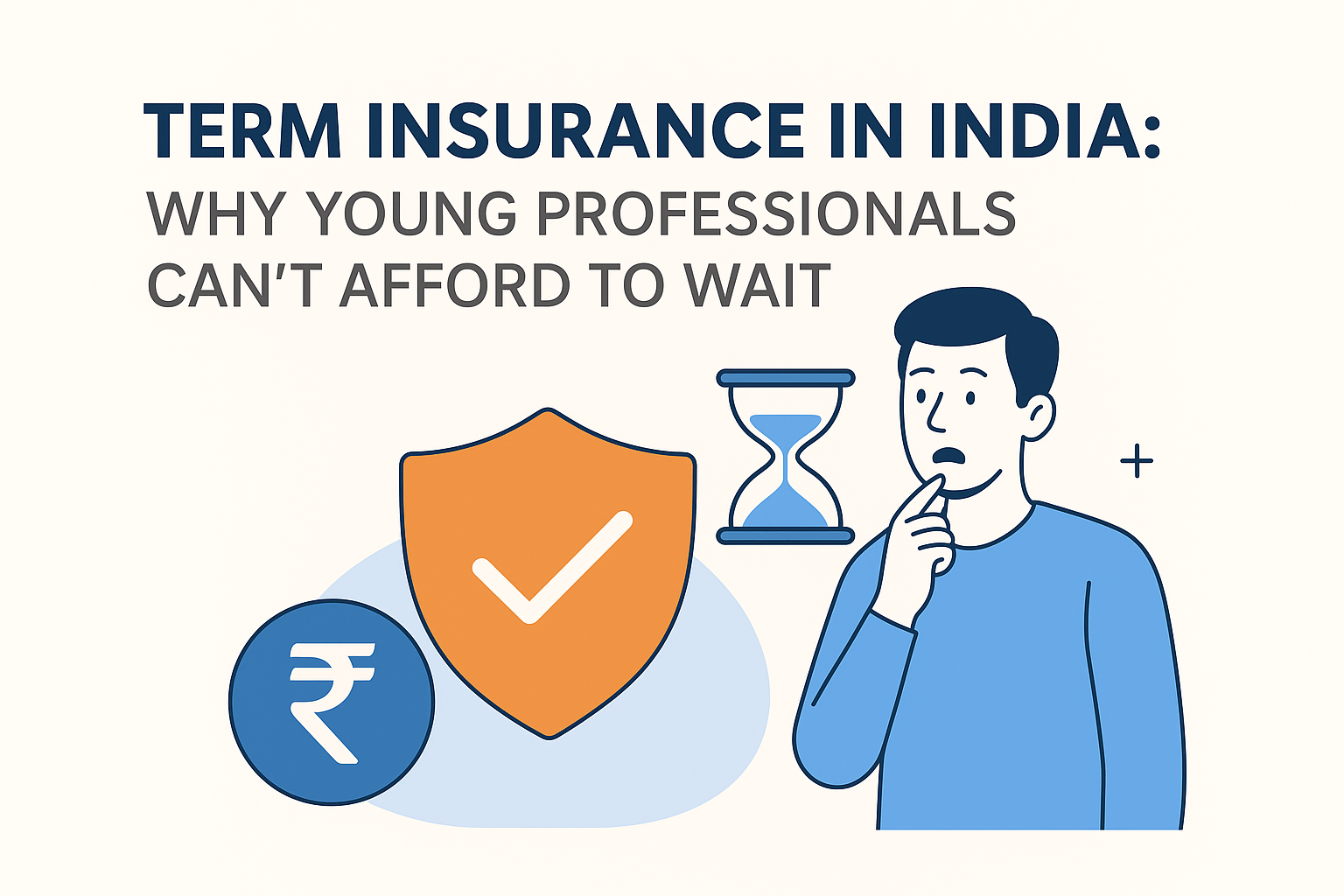Introduction
After graduating and collecting your first paycheck, you probably consider term insurance a later concern. Unfortunately, this line of thinking is one of the more costly financial decisions you might make. You are young and healthy, and your focus is rightly on building your career, rather than being overwhelmed by an uncertain future.
In the context of India’s changing economic climate, where job offers come with shorter tenures and living costs continue to rise, young professionals are in a unique position to consider the importance of early financial planning in relation to their insurance needs. To put it simply, term insurance is more than a safety net. It is an umbrella of financial protection that becomes even more beneficial when taken out earlier in your career.
According to new industry reports, India’s insurance penetration stands at just 4.2 percent, meaning millions of working professionals have not prepared for the inevitable financial risks that could derail the futures of their families. This gap presents both a challenge and an opportunity for those who are smart enough to make swift moves.
Understanding Term Insurance in Today’s Context
Term insurance policies serve a straightforward purpose. They provide a death benefit if the insured person passes away during the coverage period. However, the insured person is required to pay relatively small premiums for a specified period. These are the only policies that do not provide a combination of investment and insurance; instead, term insurance policies are designed to offer only protection.
The cost structure is one of the things that makes term insurance policies useful for young people starting their careers. The cost of insurance is delightful. These costs are based on your age, health, lifestyle habits, and the coverage you select. These policies are particularly cost-effective if you are young, have a good health record, and purchase the policy early on.
Imagine a 25-year-old individual who does not smoke. That individual can get a term insurance plan of ₹1 crore at an annual premium of ₹8,000 to ₹12,000. For a 35-year-old, the same coverage will cost about ₹15,000 to ₹20,000 per year, which is almost double the premium for a mere decade of waiting. Early buying has an added financial benefit, namely that the difference in cost accumulates over the duration of the overage.
The insurance landscape in India has undergone significant evolution. Digital platforms have simplified the application process, making medical underwriting more efficient. Top Life Insurance Companies in India now offer competitive products tailored specifically for young professionals entering the workforce.
The Hidden Costs of Procrastination
Hesitating to decide on term insurance not only ensures that you pay a higher premium later on but also has several other consequences. What may seem to be your health in your twenties as ‘irrelevant’ slowly becomes all the more significant. Any pre-existing condition, any lifestyle disease, or even any small health condition, over a period of time, can either raise your insurance premium a lot or can even make you ‘not insurable’.
In a short span of time, younger professionals tend to underestimate the rate at which their financial responsibilities increase. The ‘growth in one’s financial commitments’ which ‘begins with’ earning a living ‘for oneself’ changes into ‘financially supporting a spouse and later’ children and ‘possibly one’s parents as well.’ The ‘amount of time’ from which you start getting proper insurance for ‘financial responsibilities’ only helps later in ‘managing these responsibilities without the’ need to constantly change insurance policies.
The growth of one’s career matters a lot. As one’s salary grows, the lifestyle and financial obligations tend to grow in the same ratio. The term insurance at the 3 lakh per annum that one used to easily get is ‘no longer easy to get adequate coverage for when earning 10 lakh per annum with a home loan, car EMI, and family to support men’s icons na,’
There is also the consideration of opportunity cost. The money you save by securing lower premiums early can be invested in other wealth-building activities. A young professional saving ₹7,000 annually on insurance premiums by starting early could invest that difference in mutual funds or other growth instruments, potentially creating significant additional wealth over a 20-30 year period.
Strategic Considerations for Young Professionals
As young professionals consider term insurance alternatives, they should be aware of several strategic considerations that align with their occupational trajectory and life aspirations. The coverage amount calculation should take into account not only your current salary but also your earning potential and your family’s required lifestyle income throughout your life.
A general rule of thumb suggests 10 to 15 times your annual earnings in coverage; however, that will vary based on the individual. You may need substantial coverage if you hold debt, have dependents with special needs, or have ambitious financial goals. By the same token, if you have substantial existing savings or family wealth, you can maximize moderate coverage by structuring the premium accordingly.
When selecting the duration of the policy, there is a balance between the timeline of your financial commitments and the premium cost you can afford. Most financial advisors recommend insuring through age 60-65, as this protects your income potential during the primary working years of your career and any financial liabilities (such as a home mortgage or children’s schooling costs) until they are fulfilled.
Choosing the right insurer involves evaluating claim settlement ratios, financial stability ratings, and the quality of customer service. The Best Term Insurance Plan for your situation depends on these factors, combined with premium competitiveness and policy features that match your specific requirements.
Making the Decision: Practical Steps Forward
Converting awareness into action requires a systematic approach that removes common barriers to the adoption of term insurance. Begin by calculating your actual coverage needs using online calculators or consulting with financial advisors who can provide personalized recommendations tailored to your specific circumstances.
Research and compare multiple insurers, focusing on their claim settlement history, customer reviews, and policy terms rather than just premium costs. The cheapest option is not always the best option if it comes with poor service quality or complicated claim processes that could burden your family during an already difficult time.
Think about your payment options and company policy provisions. Some companies offer discounts on annual premiums, but others provide extras such as terminal illness cover or a premium waiver for serious illness, which can be important if these are relevant in your situation.
Medical examinations, often seen as barriers, have become more streamlined with many insurers offering simplified underwriting for younger applicants with basic health profiles. Some policies even provide instant approval for standard cases, making the entire process more accessible than ever before.
The Long-term Strategic Value
Term insurance for young professionals offers more than immediate protection – it lays the foundation for comprehensive financial planning that supports long-term wealth creation and family security. Early adoption demonstrates financial maturity and planning awareness, which often correlates with better overall financial decision-making throughout one’s career.
The psychological benefit of knowing your family is protected allows you to take calculated risks in your career that might lead to higher rewards. Entrepreneurial ventures, job changes for better opportunities, or additional education investments become more feasible when you know basic financial security is already established.
Furthermore, early adoption of term insurance teaches disciplined premium payments, which can translate into better budgeting and savings habits across other areas of your financial life. This foundation often leads to more sophisticated financial planning as your career progresses.
Conclusion
Term insurance does not mean that you are a pessimistic person who is caught up in the what-if scenarios. Term insurance is proactive financial planning that opens doors, protects your growing responsibilities, and lays a strong financial foundation for the future.
The question is not whether you need term insurance, but how you can afford to delay taking care of this important protection. Every month you defer, you make money for every insurance company through higher premiums and possibly reduce your future insurability. Financial planning doesn’t have to be complicated, but it should start as soon as your career begins.
Take the first steps to term insurance by researching your options, determining how much coverage you want, and locking in enough protection while you are young and healthy. You and your family will thank you in the future for taking the wise steps you undertook today. And even though financial planning can be complicated, term insurance is still one of the more straightforward decisions you make early on in your career.



